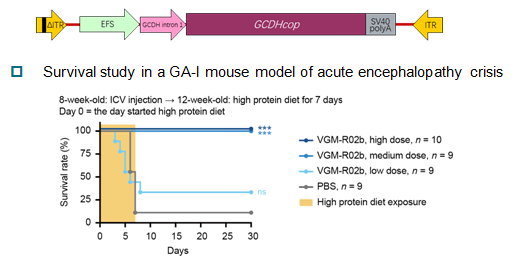

Due to glutaryl-CoA dehydrogenase (GCDH) deficiency, lysine, hydroxylysine and tryptophan cannot be correctly catalyzed, resulting in the accumulation of glutaric acid. Glutaric acid accumulation in the CNS is toxic and results in neurodegeneration.

Without proper treatment, acute encephalopathy crisis occurs in 87% of patients before 2 years old, with symptoms like macrocephaly, striatal dysfunction, hypotonia and even death.

Global: ~1/100,000
China: >1/200,000

Lysine-free diet and carnitine supplementation.
Emergency treatment for acute encephalopathy crisis.
